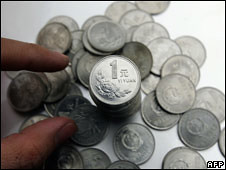
PREV ARTICLE
NEXT ARTICLE
FULL ISSUE
PREV FULL ISSUE
WHY CHINA'S CURRENCY HAS TWO NAMES: YUAN AND RENMINBI
Dick Hanscom forwarded this great BBC News article on why China's currency has two names, something I've wondered about myself recently. Here are some excerpts.
-Editor
In colloquial speech the yuan has other names too Both names are perfectly good, but in slightly different ways. "Renminbi" is the official name of the currency introduced by the Communist People's Republic of China at the time of its foundation in 1949. It means "the people's currency". "Yuan" is the name of a unit of the renminbi currency. Something may cost one yuan or 10 yuan. It would not be correct to say that it cost 10 renminbi. An analogy can be drawn with "pound sterling" (the official name of the British currency) and "pound" - a denomination of the pound sterling. Something may cost £1 or £10. It would not be correct to say that it cost 10 sterling. Nor can you talk about the number of renminbi - or the number of sterling - to the dollar. The word "yuan" goes back further than "renminbi". It is the Chinese word for dollar - the silver coin, mostly minted in the Spanish empire, used by foreign merchants in China for some four centuries. The Chinese phrase for the US dollar is "mei yuan", the American yuan. The Japanese and Korean names for their currencies, the yen and the won respectively, are derived from the same Chinese yuan character. As it happens, Chinese people rarely talk about renminbi or yuan. A fistful of kuai The word they use is "kuai", which literally means "piece", and is the word used historically for coins made of silver or copper. Also common is "10 kuai qian", literally "10 pieces of money". "Kuai" is colloquial, like "quid" in the UK and "buck" in the US, but it is the word used in everyday Mandarin, whether you are in Beijing or Taiwan - which, of course, has its own currency, the new Taiwanese dollar, also known as the yuan.
To read the complete article, see:
Why China's currency has two names
(news.bbc.co.uk/2/hi/world/asia_pacific/10413076.stm)
The Numismatic Bibliomania Society is a non-profit organization promoting numismatic literature. See our web site at coinbooks.org. To submit items for publication in The E-Sylum, write to the Editor at this address: whomren@gmail.com To subscribe go to: https://my.binhost.com/lists/listinfo/esylum All Rights Reserved. NBS Home Page Contact the NBS webmaster 
|
